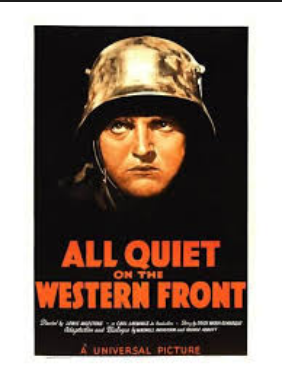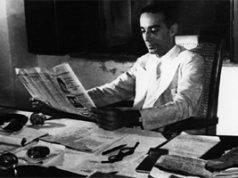All Quiet on the Western Front is a 1930 epic war film that narrates the tale of World War I as viewed from the eyes of German soldiers. The horrors of war have been beautifully captured and give a heart-rending account of the war and the lives destroyed by it, even when one is lucky enough to survive the bullets. The essence of the film is best captured by the first title card of the film…
“This story is neither an accusation nor a confession, and least of all an adventure, for death is not an adventure to those who stand face to face with it. It will try simply to tell of a generation of men who, even though they may have escaped its shells, were destroyed by the war…”
In the beginning of the film, the protagonist of the film Paul Baumer (played by Lew Ayres) and his friends are seen as a bunch of student who gets aroused by the lecture of their jingoistic school teacher and enlists in the Army to “save the fatherland” riding high on the patriotic wave and totally unaware of the horrors that are in store for them. Once on the battlefield, the rosy picture of war as painted by the teacher and all the tales of patriotic duty and bravery begins to fade as they try to survive bombs and bullets flying by and see their friends wounded, paralyzed and dead. The horrors and realities of war force them to question the wisdom behind such a ghastly act.
The following conversation between the surviving soldiers soon after the first round of battle displays the naiveté of the soldiers who fight the war for their political masters, for reasons they are totally oblivious and unsure of.
Albert Kropp: Ah, the French certainly deserve to be punished for starting this war.
Detering: Everybody says it’s somebody else.
Tjaden: Well. how do they start a war?
Albert Kropp: Well, one country offends another.
Tjaden: How could one country offend another?
Tjaden: You mean there’s a mountain over in Germany gets mad at a field over in France?
[Everyone laughs]
Albert Kropp: Well, stupid, one people offends another.
Tjaden: Oh, well, if that’s it, I shouldn’t be here at all. I don’t feel offended.
Katczinsky: It don’t apply to tramps like you.
Tjaden: Good. Then I could be goin’ home right away.
Paul Bäumer: Ah, you just try it.
Katczinsky: Yeah. You wanna get shot?
Tjaden: The kaiser and me…
[the others laugh]
Tjaden: Me and the kaiser felt just alike about this war. We didn’t either of us want any war, so I’m going home. He’s there already.
Hair-peak soldier: Somebody must have wanted it. Maybe it was the English. No, I don’t want to shoot any Englishman. I never saw one ’til I came up here. And I suppose most of them never saw a German ’til *they* came up here. No, I’m sure *they* weren’t asked about it.
Paul Bäumer: No.
Detering: Well, it must be doing somebody some good.
Detering: Not me and the kaiser.
Hair-peak soldier: I think maybe the kaiser wanted a war.
Tjaden: You leave us out of this!
Katczinsky: I don’t see that. The kaiser’s *got* everything he needs.
Hair-peak soldier: Well, he never had a war before. Every full-grown emperor needs one war to make him famous. Why, that’s history.
Paul Bäumer: Yeah, generals, too. They need war.
Hair-peak soldier: And manufacturers. They get rich.
[murmurs of agreement]
Albert Kropp: I think it’s more a kind of fever. Nobody wants it in particular, and then all at once, there it is. We didn’t want it. The English didn’t want it. And here we are fighting.
Later in the conversation, one of the central characters of the film, Katczinsky (Louis Wolheim), comes up with an innovative idea to substitute war over any conflict or disagreement.
Katczinsky: I’ll tell you how it should all be done.
[spits]
Katczinsky: Whenever there’s a big war comin’ on, you should rope off a big field…
Cigar-smoking soldier: And sell tickets.
Katczinsky: Yeah. And –
[glares at interrupter]
Katczinsky: And on the big day, you should take all the kings and their cabinets and their generals, put ’em in the center dressed in their underpants, and let ’em fight it out with clubs. The best country wins.
[everybody murmurs in agreement]
Towards the end of the film, Paul takes a trip to his hometown on a furlough where he finds the stark contrast between what the people of his town thinks of the war and the realities that he has witnessed and experienced at the battlefront. The people here are being foolishly patriotic and ignorant of the realities that they have never seen or experienced. On his visit to his old school, he sees his teacher giving the same old speech to a new batch of students and asking them to enlist to serve their Fatherland. Disgusted by it all, he returns to the battlefront even before his leave is over. He finds that most of his company men are dead and have been replaced by young kids fresh out of school just to fill the ranks, who haven’t even received proper training.
The film is a double Academy Award winner for Best Picture and Best Director. It was the first talkie war film to win Oscars. All Quiet on the Western Front has been acknowledged as the seventh best film in the epic genre of all time by the American Film Institute (AFI) in its 2008 list. This movie is highly recommended for its anti-war theme and success in highlighting the tragedies of war as seen through the eyes of individuals.
Post Disclaimer
The opinions expressed in this essay are those of the authors. They do not purport to reflect the opinions or views of CCS.






